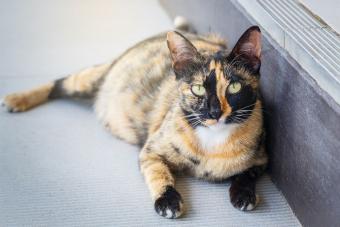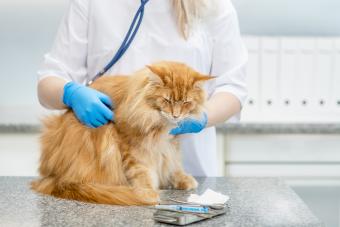
Maybe you've noticed flakes of dandruff on your cat's fur. Why is this happening, and how come it started so suddenly? There are several reasons for dry skin in cats, but it can be really hard to figure out the true cause. Those icky flakes can sometimes be a symptom of a disease, but they're more often related to nutritional issues or over-bathing. Find out what you can do to help your kitty with their dry, itchy skin.
Causes of Dry Skin in Cats
Skin disorders are actually really difficult to diagnose in cats, because they all look similar. And their underlying causes are just as hard to discern. Some of the most common causes of dry skin in cats include:
- Overbathing
- Matted fur
- Dry indoor air
- Fleas
- Skin mites
- Ringworm
- Malnutrition
- Hormonal changes
- Weakened immunity
- Diabetes
- Advanced age
Although dry skin may seem like a simple issue to treat, it is best to first consult a veterinarian, who may be able to identify any trigger factors.
Frequent Bathing Is a Common Cause of Dry Skin on Cats
Even though many cats never receive a water bath in their entire lives, some cats do need to be bathed pretty regularly. This is especially so for hairless cats and cats who can't groom themselves properly.
Although shampooing is necessary in some situations, it can also strip the natural oils from your cat's coat. When baths are spaced together too closely, the skin doesn't have time to recover its ideal balance, and soon, flaking can crop up.

Skin Diseases Like Cat Psoriasis
Felines that suffer from chronic skin problems, such as seborrhea and psoriasis, also require frequent bathing. Although this helps loosen scaling and reduce inflammation, you can still wind up with a dried-out cat.
Allergies Can Trigger Itching and Dry Skin
When your cat develops an allergy to food, environmental pollutants, inhalants, and parasites like fleas, the results of these allergies are often expressed in the skin. Itching drives your cat to scratch incessantly, and this damages the skin. You might try to provide relief through anti-itch shampoos and sprays, but as mentioned above, these products tend to rob the skin of its vital oils.
Nutritional Deficiencies May Cause a Cat's Dry Skin
Malnutrition is a common cause of dry skin problems in cats. When felines don't get their proteins, vitamins, and minerals in the right proportions, their skin and coats are the first to suffer. An unbalanced diet can lead to a deficiency in essential fatty acids, especially omega-3 fatty acids. These acids contribute to overall cellular health, and they are part of the building blocks that make up your cat's fur.
Systemic Diseases Can Cause Dry Skin
Certain diseases can also throw your cat's system out of balance, leading to dry skin. Improperly functioning kidneys or liver allow a variety of toxins to build up in your cat's body.
Thyroid problems cause hormonal imbalances that can affect every aspect of your cat's health, including their skin health. Cats with these systemic diseases tend to have unkempt, greasy fur and dry skin, along with rapid weight loss, vomiting, changes in appetite, and low energy.
Sick cats aren't as willing to groom themselves, which can lead to dry, flaky skin. Routine exams to keep your cat healthy are one of the best things you can do to prevent dry skin.
Mites Can Masquerade as "Walking Dandruff"
Mites and other parasites like fleas can lead to dry skin, but one is so well known it earned the nickname “walking dandruff.” Cheyletiella is a highly contagious mite that burrows into a cat’s skin and causes itching and flaking.
It’s called walking dandruff because you can see the mites and/or dandruff move on its own on the pet’s fur. This mite is transmitted through direct contact, so you usually see it in outdoor cats, newly adopted cats from shelters, or cats that go to the groomer or boarding.

Cat Dry Skin Remedies
So, how do you alleviate or prevent cat dry skin problems? There are plenty of things you can do to keep your cat's skin hydrated and supple.
- Feed a quality diet. Review the nutritional contents of your current brand of cat food to make sure it has all the nutrients they need. If necessary, switch your cat to a more nutritionally complete brand of cat food.
- Omega-3 supplementation. Supplement your cat's current diet by adding a fish oil supplement to their food every other day. You can also offer your cat a little fresh salmon every week. It's rich in nutrients that support healthy skin and coat.
- Provide daily brushing. This increases the circulation in your pet's skin and helps distribute natural oils across the entire scalp and coat. It also removes loose fur so it doesn't tangle up and turn into mats.
- Keep your cat hydrated. Hydrate your cat's skin from the inside out by encouraging them to drink water.
- Try a humidifier. Because dry skin can be caused by dry air, a humidifier can help add a bit of moisture into your cat's skin.
- Use soothing shampoo. If you must shampoo, only use shampoos that include moisturizers, like oatmeal, and be sure to use a cream rinse to help lock in your cat's own natural oils.

Regular Veterinary Care Is Essential
Adding Omega-3 supplements to your cat’s diet and keeping them hydrated are always helpful, even if your cat doesn’t have dry skin. But if these remedies don’t seem to resolve the issue, it’s important to see your vet. They can rule out any serious underlying diseases or parasites that could also harm you or the rest of your family.







